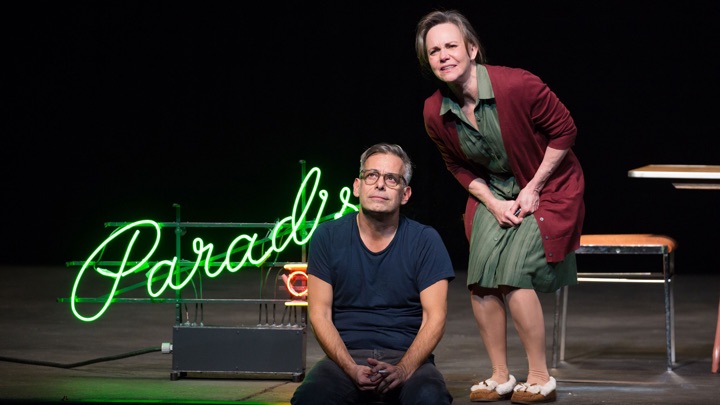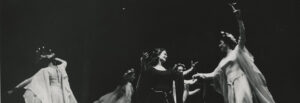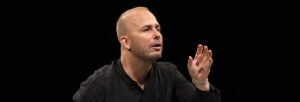
CAMERON KELSALL: It’s certainly been an enjoyable and edifying experience to be able to work through my feelings toward this complex and endlessly fascinating play with you over the last week. There seem to be more recorded versions of The Glass Menagerie than the average American classic, and that correlates with its popularity on stage. In the past 15 years alone in New York, I count four major revivals, three of them on Broadway—and between the two of us, I think we’ve seen them all. I know I have strong feelings, but before we dive into discussing those, perhaps we should turn to the other curiosities that are available for mass consumption.
Caedmon Audio with Jessica Tandy, Montgomery Clift, Julie Harris, David Wayne
DF: This 1963 audio recording still has a lot to recommend it, so it’s frustrating that it’s not in general circulation, though a noisy LP transfer in YouTube (with occasional skipping) is mostly listenable. TGM lends itself especially well to audio treatment, I think, with its narrative frame—and the idea of the “memory play” also works in forcing the listener to imagine the setting. One drawback, though, is that Laura is so non-verbal in the beginning of the play that we often forget she’s there, but even that makes a statement.
CK: That’s an interesting point about Laura, especially intriguing given the presence of an actress as expressive as Julie Harris in the role. From what I can tell, Harris never played Laura on stage when she was of the right age, though she ultimately appeared as Amanda in a 1994 Broadway revival. It’s hard to imagine she wouldn’t have been on every producer’s shortlist for a revival in the 1950s, or even as late as when this recording was made. (She would have been around 38.) She still makes an impact, particularly in the early scene about Rubicam’s Business College, but the stars of this recording, to me, are Jessica Tandy as Amanda, and Montgomery Clift as Tom.
DF: I thought Tandy was really exceptional, and 20 years later, she actually played the role to significant acclaim in a Broadway revival that neither of us saw, alas. Among the others, I was particularly struck by Clift, who of course here truly functions as a narrator. He’s very low-key, but still compelling—I thought instantly of a phrase from another Williams’ play: “The charm of the defeated.” (And is it just that I know Clift’s personal backstory—or does he really do more with Tom’s drunkenness than any other actor??)CK: Before listening, I wondered if knowledge of Clift’s baggage—in addition to alcoholism, his closeted homosexuality and early death—would have a deleterious effect on my perception of his performance. Yet while his Tom is more painfully broken than others, his choices remain grounded in the text itself, and overall, I’d rank him among the part’s standard bearers. Tandy, too, manages to flit between Amanda’s positive and negative qualities with absolute ease, and is devastating in her final confrontation with Clift. Really, the only disappointment is David Wayne as the Gentleman Caller—he pushes too hard for humor, and even for a sound recording, he’s too old. (Only five years younger than Tandy!) Still, spotty transfer and all, it’s worth seeking out.
YouTube video with Paul Bowles music, Cherry Jones & John Cameron Mitchell
CK: The Caedmon recording preserves Paul Bowles’ original incidental music, created for the debut production. That’s enough to recommend it for me. For years after, the master score was thought lost; ultimately, it was discovered among Bowles’ papers in the Harry Ransom Center. I’m not sure when this performance was made, but judging by the youthful appearance of the participants, I would assume the late ‘90s. Hearing Bowles’ music performed by a live orchestra underscores how perfectly it complements Williams’ writing—the gentle sound of the violin and harp seem to be piped in from the deep recesses of Tom’s memory.
DF: I agree completely about the music, and it was a wonderful idea to present it “in concert” while framing it with excerpts from the play. And both actors here—John Cameron Mitchell (as Tom) and Cherry Jones (Amanda) are at least on paper nearly ideal. (She, of course, would go on to play Amanda in another Broadway revival—more on that later.) Of course, both actors are also queer and out, which has its own resonance. But I think the end result is less than I hoped for—in this context, Jones doesn’t feel settled into the role, and Mitchell’s almost aggressively gay spin—including hair streaked à la Gloria Steinem—overwhelms the delicate poetry.
CK: I imagine that, at the right time in his career and with the right director, Mitchell could have been a fabulous Tom. But yes, the word I found myself settling on here is strident. Dressed in an oversized striped blazer with a dandy bowtie, I also half-expected him to break into “Lida Rose.”
httpvh://youtu.be/_WfR1PPlNTg
Sam Gold: Sally Field, Joe Mantello, Madison Ferris, Finn Wittrock (2017)
DF: My feelings about this production are so complicated and contradictory that it’s difficult to explain… and if anything, I feel more conflicted about it three years later. At the time, I reviewed it for Reclining Standards; I’ll simply say here that while I think some of Gold’s directorial ideas were preposterous, I greatly admire Sally Field for immersing herself in it, and I also found some moments almost unbearably moving. Go figure.
CK: Field appeared in a more traditional production of TGM at the Kennedy Center in the early aughts; I wish I’d seen that, so that I could compare her approaches to the material from two wildly different angles. I thought she did a lot of intricate, small-scale character work here that was interesting in its own right—hers was a very human, outwardly vulnerable Amanda. I’m not sure that perspective really gelled with Sam Gold’s flamboyant spin on the material. In particular, I recall Amanda revealing herself from the Gentleman Caller’s arrival in a pepto-pink princess dress—Gold’s modus operandi was clearly to humiliate her. That might have been more palatable with a shrewish actress in the role, but with Field, you just felt sympathy. Someone could probably write an entire dissertation on the decision to cast Madison Ferris, an actress with muscular dystrophy, as Laura; I’ll just add that, in addition to the extratextual baggage it added to the play, she wasn’t a very compelling presence as a performer.
John Tiffany: Cherry Jones, Zachary Quinto, Celia Keenan-Bolger, Brian J. Smith (2013)
DF: I came to this Broadway production, which originated at Boston’s ART, with great expectations, fueled by Ben Brantley’s rave reviews in both incarnations. Ultimately, I was mostly disappointed, though there were elements that I found effective. I admire director John Tiffany for really trying to work with the idea of a “memory play,” though the results were inconsistent, and occasionally (Laura literally appearing magically through the sofa cushions) grotesque. Among the actors, only Brian J. Smith as a heartbreakingly gentle Jim really clicked. I found Zachary Quinto (Tom) completely uninteresting, and didn’t get much more from Celia Keenan-Bolger. Cherry Jones was a force for sure, and as always, her earnestness is never in doubt, but somehow it didn’t add up. Frankly, the scene-stealer here was scenic designer Bob Crowley’s spectacular fire escape. (But what was up with the pool of primordial ooze around the stage? And why no portrait of the father?)
CK: I share your sentiments about this production, almost to the letter—I’ll add that I found Nico Muhly’s incidental music as lugubrious and obvious as Bowles’ is beguiling and revealing. I will say, though, that I appreciate any chance to see Celia Keenan-Bolger play something close to a recognizable adult on stage, as opposed to a forty-year-old toddler. (See: To Kill a Mockingbird, The 25th Annual Putnam County Spelling Bee and Peter and the Starcatcher).
Gordon Edelstein: Judith Ivey, Patch Darragh, Keira Keeley, Michael Mosley (2010)
CK: This production originated at New Haven’s Long Wharf Theater before moving to Roundabout’s Off-Broadway space. I saw the very first New York preview and found it absolutely crackling. Director Gordon Edelstein and scenic designer Michael Yeargan really leaned into the “memory play” aspect, and also the figure of Tom as an authorial stand-in: the setting was a seedy New Orleans hotel room, with Tom writing the play we’re watching, which gradually enacted itself in the surroundings. Ivey—who, as far as I can tell, is one of the few legitimate Southerners to take on the role in New York—was absolutely captivating. She played the role with a hearty mix of humor and forbearance, knowing exactly when to appear vulnerable or calculating, and her still-palpable beauty actually suggested someone who could have entertained seventeen gentlemen callers in one afternoon. Patch Darragh’s boldly gay Tom was a fascinating foil, and Michael Mosley was a caddish Jim. Keira Keeley’s Laura was moving and surprisingly determined; what a shame, then, that she is now known primarily for an incident in which she allegedly tried to push someone in front of a subway train. Oh, well: Maybe she and Felicity Huffman can star in a revival of Women Behind Bars.
DF: For reasons I can’t recall, I didn’t see this production, though I wanted to. I think maybe part of it is that I was disappointed when it came to New York that it was without Josh Charles, who had played Jim at Long Wharf? Whatever—clearly it was a stupid decision, and I regret it. Ivey would certainly be near the top of my list of ideal potential Amandas. But speaking as you were of incidents..
David Leveaux: Jessica Lange, Christian Slater, Sarah Paulson, Josh Lucas (2005)
DF: … the element of this production that most people are likely to remember is a wrinkle that occurred just before previews, when Dallas Roberts, originally cast as Tom, was suddenly replaced by another actor, Christian Slater, who is so strikingly different in type that any concept here was unimaginable. (Google the story—it’s juicy.) Anyway, the end result was a bumpy production that got generally mixed to poor reviews, though I liked some of it better than most critics I know. High on my list of positives is Jessica Lange’s Amanda, totally unlike any other I’ve seen, and to me a revelation. Her considerable physical beauty was coupled with a sense of narcissism that explained so much about Laura’s situation. It’s Lange’s voice I now hear in the jonquils speech, so chillingly self-centered. Frankly, no other performance came near hers for interest—not even Sarah Paulson (Laura), who should have been terrific, but didn’t register much. Slater, likely under-rehearsed in the circumstances, had some good moments—he found humor in a lot of it—but lacked emotional depth, and Josh Lucas (Jim) was an absolute write-off, essentially diluting the entire, usually shattering, final scene. I liked that director David Leveaux brought back some expressionist elements, but it didn’t really cohere.
CK: I was aware of the backstage dustup going into this production, so I think I expected something juicy to play out onstage. (This was my first live experience with the play, as a high-school senior.) On the contrary, my general memory is of a rather bloodless evening. I went after the tepid reviews dropped, so perhaps the company was in dim spirits, but it’s hard to recall anyone (even Lange) really standing out. The now-ubiquitous Paulson made little impression; I never would have pegged her as a television star on the rise from that performance. The terminally hetero Slater seemed to be doing a Jack Nicholson impersonation during his monologues. If anything struck me as memorable, it was the work itself—a play that, as our series of appraisals here suggests, we’re happy to turn back to endlessly.
DF: I think I hear our cue line. Time to blow out the candles—but I’m keeping a box of matches handy, since I know there will be more TGM‘s sometime in our future!
Photo: Julieta Cervantes


